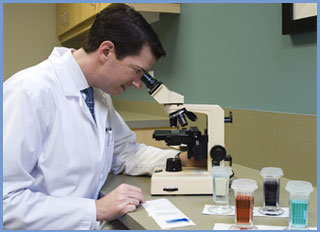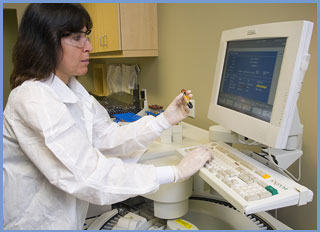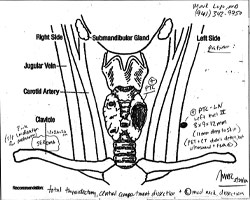|
|
 |
 |
 |
 |
Our mission is to provide efficient patient care for the treatment of thyroid disease consistent with the highest standard of medical excellence and the latest innovative technology. From ultrasound exams to our on-site laboratory, the Thyroid & Endocrine Center of Florida is uniquely equipped to diagnosis and treat all aspects of thyroid disease. |
|
 |
|
 |
 |
 |
 |
 |
 |
|
|
 |
A thyroid ultrasound exam uses harmless sound waves to produce images of the thyroid. Vital information is gathered during the ultrasound exam including the size of the thyroid, detection of any inflammation in the thyroid, as well as the blood flow through the thyroid. Thyroid nodules and cysts are measured and detailed descriptions of their characteristics are recorded.
Our office utilizes advanced ultrasound equipment in the detection of thyroid disease. All our physicians are Endocrine Certified in Neck Ultrasound (ECNU). The ECNU credential certifies that an Endocrinologist displays a high level of competence in diagnostic and interventional neck ultrasound. Our office is one of the few practices in the nation accredited by the American Institute of Ultrasound in Medicine (AIUM) for thyroid and parathyroid ultrasound. Our physicians perform consultations and evaluations for thyroid and parathyroid disorders through both diagnostic ultrasound and ultrasound-guided fine needle aspiration (UGFNA).
|
 |
Ultrasound exams are simple and painless. During the exam, the patient lies flat with the
neck slightly extended. Gel is applied to help sound waves travel through the skin. The
ultrasound probe is moved around the neck to create real-time images of the thyroid and
surrounding structures, including lymph nodes.
Benefits of ultrasound exams done by a clinician in our office include the ability to
immediately read and interpret the images, discuss the results with the patient, and
apply our knowledge of the patient’s medical history to the ultrasound imaging.
Moreover, the patient is not inconvenienced with additional trips to an off-site radiology
department. This method is superior to a non-physician technician taking pictures,
sending those pictures to a radiologist, who is then limited by having only still shot
images of the ultrasound study and no detailed medical history to aid in the medical
interpretation of the ultrasound images.
For thyroid cancer patients, we perform a review of the surrounding lymph nodes to
help determine if cancer has spread to these lymph nodes. This type of ultrasound
follow-up has replaced nuclear medicine imaging for thyroid cancer recurrence
detection and is best done at a dedicated clinical thyroid ultrasound facility such as our
office.
|
|
|
 |
|
|
 |
 |
 |
 |
 |
 |
|
 |
To better assess a thyroid nodule, a biopsy is often necessary. A fine needle aspiration biopsy (FNA) uses a small needle (smaller than most blood draw needles) to obtain cell samples from the thyroid nodule. This procedure is performed under ultrasound guidance to ensure that the needle tip is within the targeted nodule at the time of aspiration. Our doctors have performed thousands of these procedures and use the smallest needle possible to achieve an adequate cell sample. Local anesthesia can be used but is seldom needed for this procedure and most patients feel it is less uncomfortable than a visit to the dentist. FNA does not require any special preparation (no fasting), and patients usually return home or to work after the biopsy without any ill effects. |
 |
|
|
 |
|
|
 |
 |
 |
 |
 |
 |
 |
 |
FNA biopsies are sometimes limited by inadequate samples of thyroid cells for interpretation. To minimize this problem, we prepare the slides then microscopically review each slide in order to determine adequacy. Slide review is done while the patient is still in our office. By utilizing this unique adequacy method, additional FNA biopsies can be performed if necessary to achieve adequacy. Using this method, the likelihood of inadequate sample is less than 2% -- much lower than the 15-20% that is reported to be the national average.
The slides are then sent to an expert thyroid cytopathologist at the University of Arkansas for Medical Sciences, Dr. Nicole Massoll for further study and diagnosis. Some insurance companies are not contracted with the University of Arkansas for Medical Sciences and in these cases, either the patient elects to pay for the expert reading or the slides are sent to another facility.
|
 |
|
|
 |
|
|
 |
 |
 |
 |
Radioactive iodine (I-131) treatment is sometimes used in the management of hyperthyroidism and thyroid cancer. Many thyroid cancer patients do not require I-131 but this determination should only be made by a specialist in thyroid cancer treatment options. Additionally, hyperthyroidism can often be managed without the use I-131 treatment. We offer evaluation and coordination of treatment with I-131 when indicated for hyperthyroidism and thyroid cancer cases. |
 |
|
 |
|
|
 |
|
|
 |
 |
 |
 |
 |
 |
 |
 |
Our thyroid function lab is a CLIA certified facility using state-of-the-art
equipment to process blood samples. We offer a wide range of thyroid testing
including, but not limited to, TSH, free T4 (Thyroxine), free T3
(Triiodothyronine), Thyroperoxidase (TPO) antibodies, Thyroglobulin (Tg)
antibodies, Thyroid Stimulating Immunoglobulin (TSI) and TSH Receptor
Antibody (TSHR).
Our lab is staffed by a highly skilled laboratory technician and two licensed
medical phlebotomists. Standard quality assurances and proficiency programs are
in place to ensure consistent testing integrity. |
 |
|
|
 |
|
|
 |
 |
 |
 |
Cancer of the thyroid is uncommon, but with an estimated 64,000 new cases diagnosed
each year and the 8th most commonly diagnosed cancer in women, thyroid cancer is on
the rise.
When thyroid cancer is detected, the typical treatment is surgery to remove the entire
thyroid gland. When preparing patients for surgery, it is critical to evaluate the
surrounding neck area for any abnormal lymph nodes to which the cancer may have
spread. A comprehensive neck ultrasound is the most sensitive and effective method to
determine if there are abnormal lymph nodes which would require surgery beyond
removal of the thyroid alone. We call this type of exam a Pre-operative Ultrasound
Mapping. |
 |
Pre-operative Ultrasound Mapping identifies lymph nodes that can be biopsied to confirm
metastasis in order to help the surgeon plan additional dissection of the involved lymph
node compartments. A map is created for the surgeon that guides the extent of surgery.
In more complicated cases, it is best to perform the pre-operative neck ultrasound with
the surgeon present in our office in order to visualize the abnormalities and plan the
surgical approach. If needed, during the surgery itself, we can talk to the surgeon about
the anatomy and location of the metastatic lymph nodes in order to locate and remove the
cancer.
Unfortunately, many patients in the U.S. undergo thyroid cancer surgery without Preoperative
Ultrasound Mapping and, in about 15% of cases, this results in leaving behind
lymph nodes to which the cancer has already spread. These cancers are then
“discovered” years later during cancer follow-up exams and usually require additional
surgery.
Our goal through Pre-operative Ultrasound Mapping is to increase the probability that the
initial surgery is the only surgery patients will need. Pre-operative Ultrasound Mapping
is performed for all our patients undergoing surgery for suspected thyroid cancer.
We strongly believe this method improves the care of the thyroid cancer patient through a
team approach between the thyroid specialist and the thyroid surgeon. |
|
|
| |
| |
|
|
|
 |
 |
MEDICAL DISCLAIMER: The information found on this website is for educational purposes only and is not providing medical or professional advice. It should not be used for diagnosing or treating a health problem or disease. It is not a substitute for professional medical care. If you have or suspect you might have any health problems, you should consult a physician. |
 |
 |
|
|
|